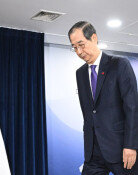Centennial Anniversary of Patriots Sacrifice
Centennial Anniversary of Patriots Sacrifice
Posted March. 25, 2010 23:50,
Tomorrow marks the centennial anniversary of the death of Korean patriot Ahn Jung-geun, who was executed by the Japanese colonial government of Korea at a prison in China. The Korean Army has bestowed Ahn the posthumous rank of general and has renamed the conference room at the command center of Gyeryongdae Army headquarters in Daejeon to Gen. Ahn Jung-geun Room. After his arrest by Japanese military police, Ahn identified himself as a lieutenant general of the Korean patriotic military. He also left a written message saying, A soldiers inherent obligation is to sacrifice his life for his country. The Army apparently intends to honor Ahns military spirit.
Civic organizations are also staging a signature-collection campaign to elevate the rank of Gen. Ahn Jung-geun of the Korean patriotic military by one level. As many as 150 lawmakers have participated in the campaign to promote him to major general. A source with one organization said, The patriot is a title for the Korean people, and the general is an international title. He added, His patriotic crusade will be properly recognized internationally only when we call the patriot Ahn a general. One scholar said, If we call Ahn a patriot, it suggests he conducted his patriotic assassination of the top Japanese colonial official by himself only, and hence this will comply with Japans intent to merely consider him an individual murderer.
More than a few voices oppose calling Ahn a general, however. The Patriots and Veterans Affairs Ministry said, Calling him Ahn is no different from demoting his stature instead of promoting it. Minister Kim Yang said, It is inappropriate to call a patriot, who can emerge once in decades, a general, a title that 60 people receive every year. Others say the title of general can reduce the significance of his patriotic assassination at Harbin Station, and blur the image of Ahn as a thinker who urged peace in Asia.
The first U.S. president, George Washington, was commander-in-chief of the independence army as a three-star general in Americas war for independence. Washington was officially recognized as a general a year before his death. That is, his successor John Adams gave him the title of lieutenant general. President Gerald Ford again promoted Washington posthumously by three ranks to call him the Great Marshal when the U.S. marked its bicentennial anniversary. Following the U.S. example, Ahn can be posthumously promoted to general because he led Koreas independence fighters at a time when the empire of Koreas military had been dismissed by Japan. Instead of trying to honor Ahn as a formality, however, Korea should use his great sacrifice for the nation at a time when Korea was on the brink of demise as a model of patriotism.
Editorial Writer Yook Jeong-soo (sooya@donga.com)







